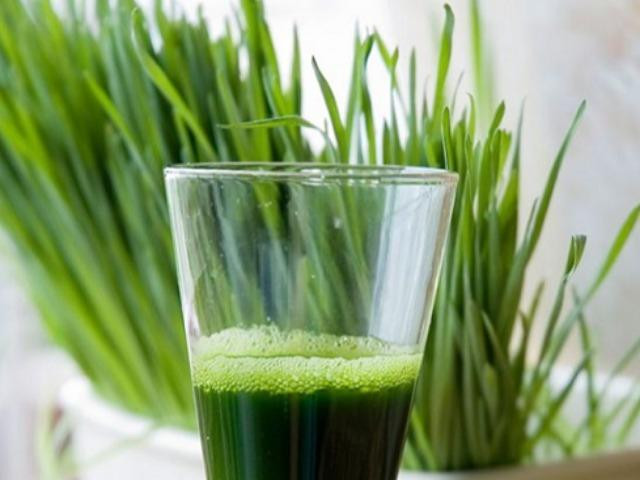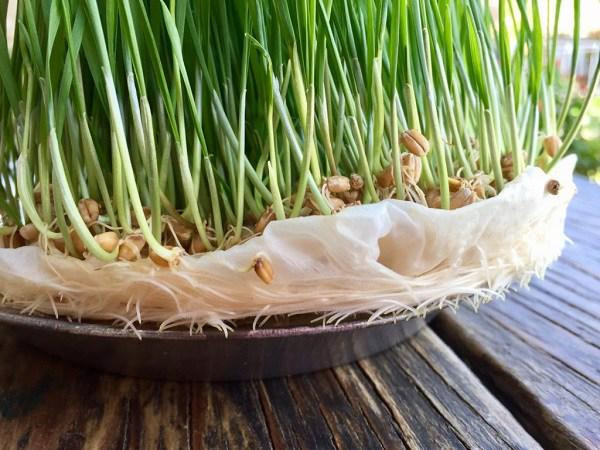Many people are 'crazy' about wheatgrass because it helps beautify, improve digestion, and prevent cancer: What do experts say?
Although wheatgrass has many nutritional values and certain health benefits, experts say that using this grass to treat diseases needs to be carefully considered.
Recently, on many social networking forums, information has appeared about using wheatgrass powder or juice to drink to beautify the skin, lose weight, restore health for people undergoing cancer treatment, good for digestion and cardiovascular. Before the introduction of the miraculous uses of this grass, many people have bought wheatgrass powder, fresh wheatgrass to mix with water or squeeze to get juice for use. Some people also order seeds to plant themselves because they think that this is both economical and ensures quality.
Regarding the above information, Associate Professor Dr. Nguyen Duy Thinh, an expert in Biotechnology and Food, said that wheatgrass, also known as malt sprouts, if grown and used properly and hygienically, has certain effects on health. Because in malt sprouts there are enzymes that convert starch into sugar, making food easier to digest. At the same time, there are many nutrients such as protein, lipid, vitamin B1 and E...
 |
Although wheatgrass has many nutritional values and certain health benefits, experts say that using this grass to treat diseases needs to be carefully considered. Illustrative photo |
However, Associate Professor Thinh also warned that there is currently no research confirming that this type of grass helps prevent andcancer, at the same time the detoxification mechanism is also unclear. Therefore, people need to be careful when using it, it is best to only use it as a normal drink, do not overestimate the effects of this herb.
Sharing the same opinion, Master of Traditional Medicine Vu Quoc Trung (Van Giang, Hung Yen) said that wheatgrass, also known as barley grass, has a sweet taste and neutral properties, helping to support good digestion. However, there is no basis for supporting cancer treatment. When using it, it should not be used too much or continuously, as it will cause adverse effects on the digestive system, most notably digestive disorders.
From a nutritional perspective, Dr. Nguyen Trong Hung (National Institute of Nutrition) said that wheatgrass has many nutritional components that are good for the body. Some documents also say that this type of grass helps improve the skin, improve blood sugar disorders, improve digestion and reduce cholesterol...
Specifically, 100g of wheatgrass contains the following nutrients: Vitamin B2 - 0.156 mg; Vitamin C - 2.5 mg; Sodium - 15 mg; Phosphorus - 201 mg; Iron - 2.15 mg; Fiber - 1g; Fat - 1.25g; Energy - 200 kilocalories; Vitamin B6 - 0.266 mg; Vitamin B1 - 0.224 mg; Zinc - 1.66 mg; Potassium - 170 mg; Magnesium - 81 mg; Calcium - 30 mg; Starch - 43g; Protein - 7.5g; Water - 48g.
Although wheatgrass has many uses and nutrients, Dr. Hung asserts that there is currently not enough scientific evidence to prove that wheatgrass effectively supports any specific disease. Therefore, people should be cautious when using it, especially pregnant women.
 |
Wheatgrass is grown in a humid environment so it is susceptible to harmful fungi and bacteria. Illustration photo. |
“Wheatgrass grows in moist conditions, so it can harbor bacteria and molds. If you eat raw wheatgrass containing these bacteria, you may experience headaches and nausea. Women with gluten allergies or celiac disease are at higher risk of experiencing these symptoms.
The powerful antioxidants found in wheatgrass can help the body eliminate toxins, but it can also directly impact the fetus, causing birth defects or even miscarriage.
Even consuming too much wheatgrass can lead to diarrhea and vomiting. This will cause an imbalance between important nutrients during pregnancy,” Dr. Hung warned.
Dr. Hung said that those who have never drank wheatgrass juice should not try it, especially pregnant women. If they have used it, then during pregnancy, women should not use fresh wheatgrass juice.

